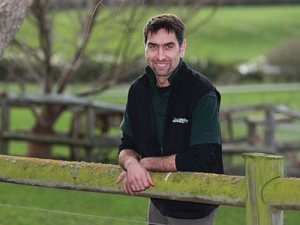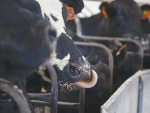VetSouth says the record low dairy payout is pressuring farmers’ budgets and forcing hard choices on them. But it’s not their cows’ fault, and they shouldn’t have to struggle. So the practice has set out to support cow and farmer welfare with two schemes.
The first scheme, called ‘Keep Calm’, offers all clients a free calving.
VetSouth director Mark Bryan explains: “We calved at least 700 cows last season, and there are probably more cows that could be helped but we don’t see them.
“Farmers’ financial position this coming season is going to make more difficult the choice between a calving or culling the cow. So we thought, why don’t we remove the cost barrier?” They hope that by removing some of the pain they will ease farmers’ worries and cows’ difficulties.
The first calving on any farm will be free, Bryan says. “We were pleased at how the younger vets got behind us in this. It was great to see them support clients and their colleagues.”
The second scheme is an offer to examine and treat all sick cows for free.
VetSouth director Vince Sharp says the thought of cows not being treated, or being treated inappropriately, because of the difficult times, didn’t sit well with them. “So we decided we would remove this barrier.”
The practice expects that more cows will get appropriate treatment because it’s free, and that in the process farmers and staff will gain more skills.
“Having a vet on a farm is not just to treat what’s in front of you, but also to teach staff to better detect and treat it themselves the next time,” says Sharp.
It’s also to keep an eye on developing animal health risks or production issues; farms that engage more with vets typically have lower animal health costs and fewer disease issues.
“The worst thing farmers can stop investing in is animal health,” says Bryan. The dairy community in the lower South Island has been good to VetSouth, he says, and his team are happy to give something back.











